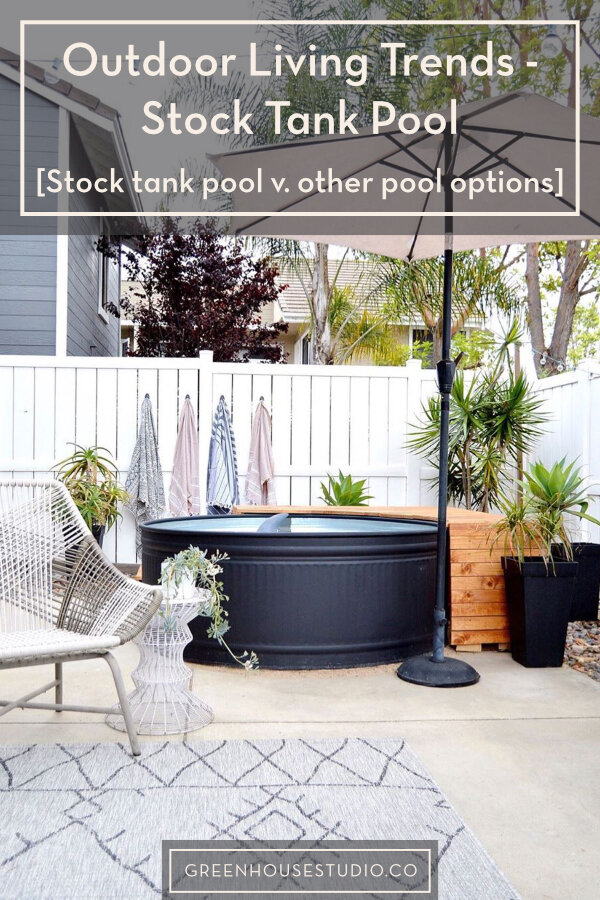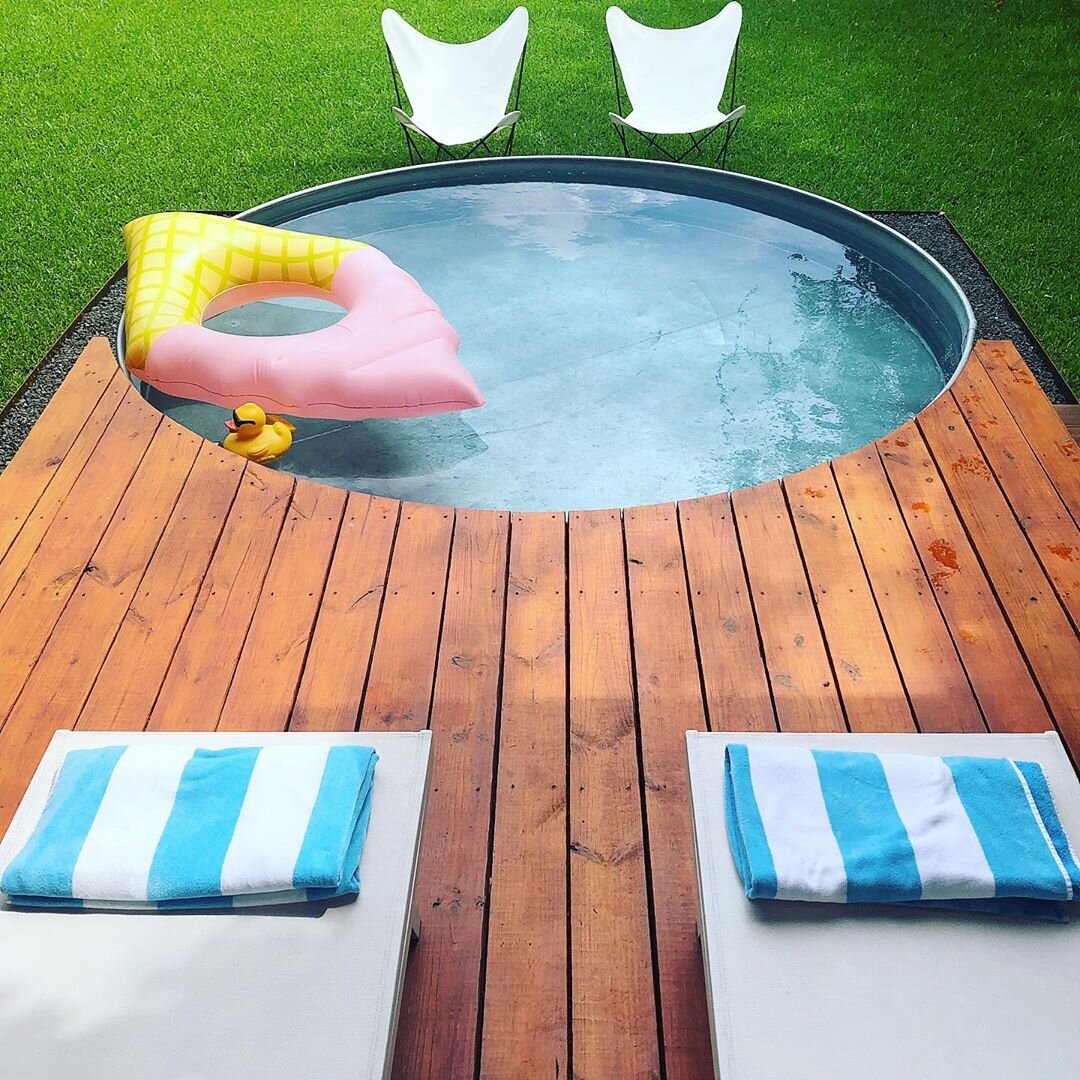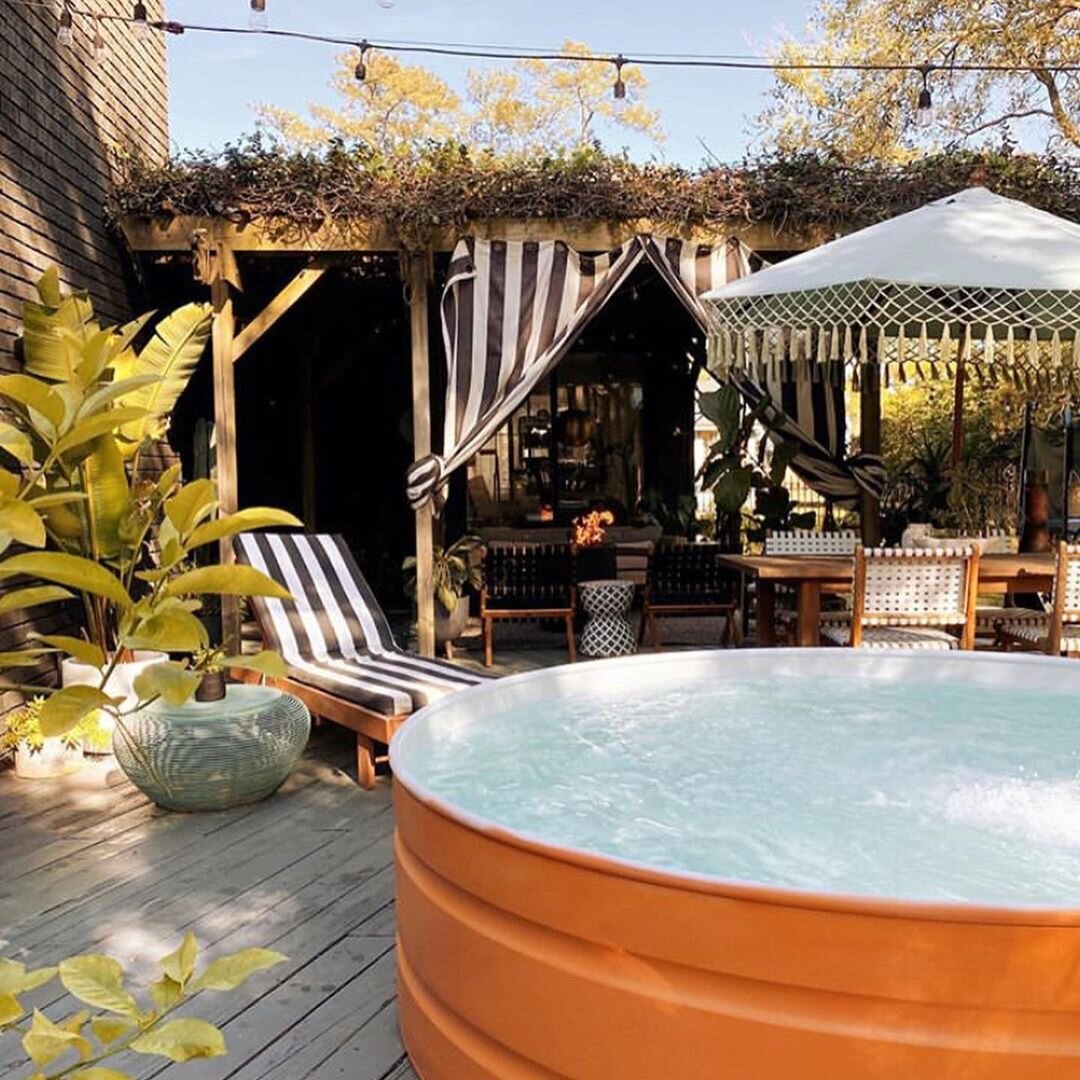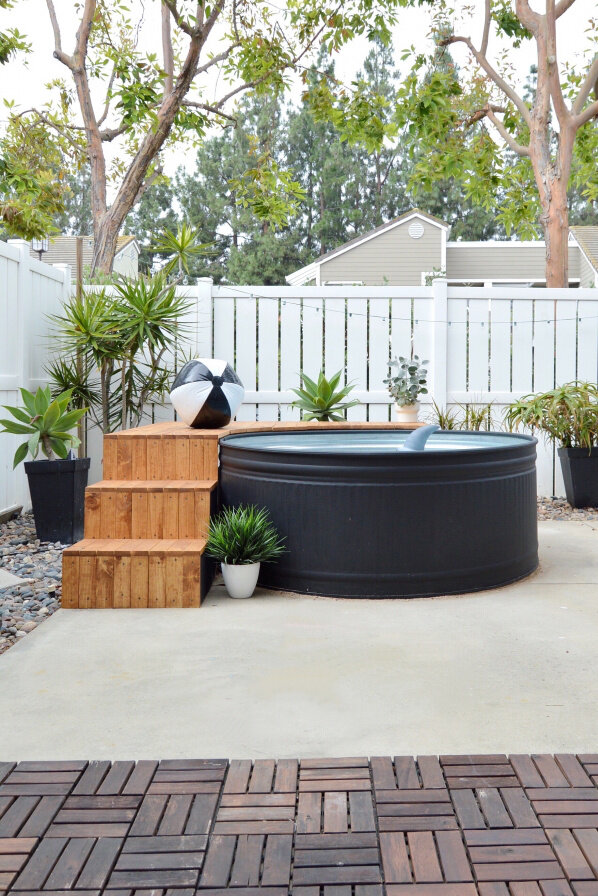Stock Tank Pool DIY - Outdoor Living Trends
[Stock tank pool v. other pool options]
Stock tank pools are an outdoor trend I came across a while back and I have to say, I’m feeling like I’ve been living under a rock. Just in case you’ve been under one too, a stock tank pool is a galvanized tank normally used to water livestock that’s repurposed into a small, backyard pool. Typically it’s an 8 ft stock tank in diameter by 2’ to 3’ deep.
It’s a budget-friendly backyard trend with legs, and they’re many creative, industrious people out there who’ve made them into total Insta-worthy assets for their own outdoor oases.
Thinking about DIYing your own stock tank pool or just curious? Let’s check them out together!
This post contains affiliate links. Click here to read my full disclosure.
Emerson Grey Designs Bri Moysa’s stock tank pool looks right at home in the corner on her neutral-schemed patio. Source | @brimoysa via Instagram.
Where’s this trend coming from? They say necessity is the mother of invention, and I think families are fully ready for some outdoor fun, and staycations are a viable option. Now that stock tank pools are on my radar, they’re cropping up everywhere like mushrooms, from Instagram to articles in major media outlets like the Wall Street Journal and the New York Times.
This is such a great idea for outdoor fun that doesn’t cost a fortune. Let’s take a look at traditional pool options and then explore this summer-style trend that just might be the perfect addition for your patio.
[Want more design inspo and helpful plant tips? Let's hang out on Instagram!]
Stock tank pool v. traditional pool - cost:benefit ratio
Here in the San Francisco Bay Area, you really can’t install an in-ground pool for under 50k, usually more like 75k. Obnoxious, I know, and totally unattainable for most of us. Above ground pools are pretty much non-existent around here - I don’t know why.
Then there’s the time and effort factor. For your investment, you’ll have a landscape architect design and draw up the plans, an engineer will have to review and “engineer” it, plans will have to be submitted to the city or county for the permitting process, and then the construction phase. After many months and a whole lotta dollars, you finally have an in-ground pool.
A pool adds value to your home, but the real question is what’s your ROI - return on investment? (Read more about calculating ROI in home improvements.) More often than not, at least around here, a pool may only add about 25k or so of value to a home. This is according to my mother who’s a real estate appraiser in the CA Central Valley, adjacent to the Bay Area, so it’s likely more than 25k in the Bay Area, but it’s pretty darn unlikely to be equal to your initial investment in most locations.
A spectacular in-ground pool designed by Santa Barbara & Napa based landscape architect Christian Barrett Hedberg. Source | Christian Barrett Landscape Architecture
Your ROI also depends on the condition of said pool when you go to sell. People often don’t realize how pools age and deteriorate. Working with clients, I’ve seen more than once the pool with the dated hardscaping, the cruddy, cracked surfacing, and deteriorating equipment that is now more eyesore than asset.
Sometimes buyers don’t want the pool at all. Either it’s too expensive to fix up, it’s a liability if its a rental property, they’re worried about the dangers of small children and pools, (the leading cause of death for kids between 1-4 in CA) and they want to fill it in. That costs around 15k in this neck of the woods.
All of this for something that’s used a few months out of the year, and less so as your kids get older. Just wait. :)
I’m not trying to bash in-ground pools - I personally love swimming and would definitely use one if I had one. I’m just making the point that a homeowner needs to weigh the cost:benefit ratio before diving into the deep end. That’s all.
Clean and contemporary design with decking and black rock surrounded by turf for this stock tank pool. Source | Stoneway Swim Club, repost from @a_mcrogers via Instagram.
Stock tank pool v. vinyl or plastic pool - aesthetics and durability
A low cost, easy option similar to a stock tank pool but with even less initial work to set up is one of the vinyl or plastic pools. They come in similar sizes to stock tank pools - often around 8’ wide and 2’ to 3’ deep like this vinyl pool from Amazon.
This can be an easy, quick setup with minimal fuss and expense in the range of $150 - $400 for the pool + filter pump. However, I have concerns about a couple of things - the first being durability.
Most have inflatable upper rings with a support frame and some are entirely inflatable. Vinyl is durable but doesn’t hold up all that well long term under the sun’s hot UV rays.
Also, how long before the rambunctious neighbor kid does a swan dive into it while clutching his home-made Clash of Clans-inspired weaponry and punctures a hole or damages the frame? (This would’ve happened in a cool second with my three.)
This stock tank pool in Joshua Tree has it’s own stucco coping complete with tile inset and a built-in deck surround. The geometric pattern looks painted onto the side of a shipping container. Source | @tiffanymkim via Instagram
Next, I have to say, those vinyl pools just aren’t very attractive. I ask you, have you ever seen one that enhanced the décor of your or anyone’s summertime backyard oasis? I rest my case.
Last but not least, they are unsustainable. These vinyl/plastic pools are functional for a period of time until they inevitably get damaged through use or exposure, and then they’re obsolete. What happens then? They end up in a landfill. Forever. Plus, you need to buy another one for next summer, and they aren’t cheap.
Stock tank pools on the other hand, are made from galvanized steel and can last 10 or more years with proper care. Steel is one of the most recycled materials in the world. Even galvanized steel, which has a coating of zinc for rust protection, can be recycled. If you want to recycle your galvanized stock tank pool eventually, you can call up a scrap dealer who will take it off your hands.
Shack Attack’s Airbnb rental in Joshua Tree, CA comes complete with an oval, painted stock tank pool sited perfectly in the desert that’s an insta-fave. Source | @the_shack_attack, repost from @maur.b via Instagram
Stock tank pool deep dive
I’m a girl who loves a design solution that simplifies and reduces, so imho, the stock tank pool can be a brilliant small-scale alternative to a traditional pool, eliminating most of the time, expense, and fuss. With a little planning and effort, it can look fabulous too while keeping you and yours cool.
First, let’s cut to the chase: what’s the cost of this super-stylish summer fun?
Stock tank pool cost
Approx. $500 for a galvanized 8' stock tank and the supplies are around $300 or more if you choose a filter (recommended), chemicals, etc. depending on your setup.
Stock tank pool basics
A stock tank pool is transformed from galvanized livestock water trough into hipster mini-pool party by:
Buying a stock tank and drilling a hole in it to add a filter pump. The filter is key since it helps prevent the growth of algae and bacteria. It also keeps the water circulating which is important to help prevent mosquitoes from breeding. Be sure to get a filter made for above-ground pools for easy installation.
The hole must be sealed with an epoxy putty made for metal repair.
Site your stock tank on level ground - this is important to prevent damage and leaks.
An 8’ stock tank holds 700 gallons, so it must be on firm, level ground.
Placing it on an elevated deck is not recommended unless serious supports are in place since they can weigh as much as an SUV when filled. A concrete foundation is ideal.
Galvanized stock tanks have a zinc coating to help prevent rust (that’s the “galvanized” part) but they’re still susceptible after a few years. They can be additionally protected with a clear, flexible sealant like Flex Seal or a truck bed coating spray like Rust-Oleum Automotive.
You’ll likely want to treat the water with chlorine to help keep it clean. Salt water treatment isn’t a good option because it’s too corrosive. Chlorine is also corrosive, but less so.
Use slow release chlorine tablets to keep the levels even and low instead of adding a lot at once which will be more corrosive.
Chlorinate in style with this super fun flamingo chlorine dispenser.
If the water still gets dirty, it can always be drained - stock tanks come with a spigot. Pressure-wash or scrub, and refill. I bought my pressure washer from Home Depot and it definitely gets the job done.
Mosquito netting hung around your stock tank pool adds romance while helping combat mosquitoes. Source | @letsaddsprinkles
I've always thought mosquito netting creates a romantic ambiance, even if it actually serves a more practical purpose. If you feel the same, here's a Amazon option for extra-large netting .
To paint or not to paint?
There are many beautiful insta-snaps of colorful, cheery, and stylish painted pools. Here are a couple tips:
Whatever you do, use a paint suitable for galvanized steel. Epoxy paints and waterproof pond paints are options. Using regular spray paint will probably result in chipping in no time. Do your research.
- Follow instructions carefully for how to properly prep the surface.
- Follow surface prep with a specially formulated primer for galvanized surfaces.
Here’s helpful info on painting galvanized surfaces from paint experts Dunn-Edwards.
Ashley Anderson decided to combat the heat and humidity of Florida summers with this charming and cheerful painted stock tank “swimming hole”. Source |@asellers00 via Instagram
Stock tank pool bells & whistles
Some DIYers just go all out and build deck surrounds, seating, lighting, and even take them in-ground - the works!
Loads of ambiance with design blogger SF Girl’s stock tank pool complete with festival lights surrounding decking and bench seating. Source | SF Girl
Taylor Jarrell of Taylor Michelle Design made hers an in-ground stock tank pool! Source | @taylor_michelle_design via Instagram.
Another view of Emerson Grey Designs stock tank pool with a terrific deck surround built for sitting while soaking feet. Source | @brimoysa via Instagram
More stock tank pool DIY info and inspo
What do you think? Are you inspired and ready to take on this trend? With the heat in Napa lately, I know I sure am! Happy Summer!
[Want more design inspo and helpful plant tips? Let's hang out on Instagram!]
Enjoy the stock tank pool DIY post? Pin it for later!













